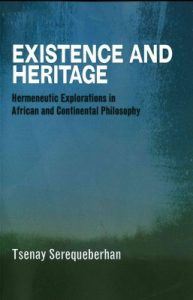 Richard Marshall interviews Tsenay Serequeberhan in 3:AM Magazine:
Richard Marshall interviews Tsenay Serequeberhan in 3:AM Magazine:
3:AM: You approach philosophy, and in particular African philosophy, from a hermeneutical perspective, a tradition that you place Heidegger as being an important (though personally odious) figure. So, can you first say why you think a Heideggerian and Gadamerian hermeneutics is the best approach to contemporary African philosophy, especially given that it is a tradition heavily indebted to a specific Eurocentric and Germanic orientation in its beginnings?
TS: In responding to this question, I would like to begin by pointing out the obvious. From an Africanist perspective—of any strip—most of the European philosophical tradition is rather odious. Indeed, as I have shown, by exploring destructively the historical-political perspectives of Kant, Hegel, and Marx, the views of these icons of the Occidental tradition are saturated with a Eurocentrism which they take to be consubstantial with the humanity of the human as such. And it is not only them. If one is willing to do the detailed destructive leg-work, one will see that the Occidental tradition is grounded on a metaphysics that privileges the Christian West. By contrast, Heidegger (his personal and odious political blunders not withstanding) articulates a question—the being question— that systematically undermines this tradition by putting it into question and pointing out that it, this tradition, has forgotten/covered-over what it means to be.
Now, an African philosophical perspective, that takes itself seriously, must engage the question of being—i.e., what to be means—for contemporary Africa, since colonialism, above all else, destroyed the differing modes of African being-in-the-world. Indeed, the struggle for African freedom (which presently has achieved only the status of formal independence) is aimed at precisely this; reclaiming the African experience of being from within the context of our contemporary world. This is what Amilcar Cabral means by “return to the source.”
More here.
